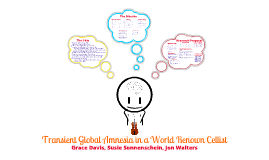

Neurologists in the United States said they were not aware of similar research in this country.īeyond stress, transient global amnesia is associated with a strange assortment of possible triggers: sudden immersion in cold or hot water, strenuous activity, sexual intercourse, some medical procedures, and mild head trauma. Ralph Werner, one of the doctors involved in the study, said the numbers returned to baseline this year, possibly because the pandemic no longer seemed so frightening. 1 and May 15, 2020, the hospital saw 16 patients with the condition compared with an average of 9.7 during that time period in the previous 10 years. The researchers thought stress might be to blame. A recent study from a German academic medical center found an increase in transient amnesia cases in the early days of the COVID-19 pandemic. “It’s always a frightening, disturbing event,” Young said.Īmong the potential triggers are stress and strong emotions.

The bad news is that it’s still very distressing for patients and families. TGA does not seem to be a harbinger of worse things to come, and only 5% to 15% of patients have a second episode, said Young, who has studied recurrent cases. “I don’t have bad news for these patients, and neurologists often have bad news,” said Nathan Young, a Mayo Clinic neurologist. His earlier memories came back just as suddenly as they had vanished, but Hanson, now 51, still doesn’t remember what happened during those eight hours. Hanson not only remembered why he was there, he remembered that the doctor had asked before. A few minutes later, the doctor asked again. He didn’t remember that, either, a sign that something was very wrong.Įight hours later, a doctor asked whether Hanson knew why he was in the hospital. He teared up when Bobbi-Jo reminded him that he had bought tickets to an Ultimate Fighting Championship event when they returned home to Colorado Springs. But the last six months were a blank, and he wasn’t making any new memories. “Where am I?” “Where’s my phone?” “Where’s my wallet?” He remembered who he was. Every 15 seconds or so, he’d ask the same questions. Afraid he was having a stroke, she rushed him to a Miami hospital. “I don’t want to scare you,” he told her, “but I don’t remember any of that.” He’d just been on the balcony, and they had eaten several meals there. Hanson was preparing to leave his beachfront hotel on the last day of vacation when his mind started malfunctioning in a rare and mysterious way.Īs he put on a shirt, he told his wife, Bobbi-Jo, that he wished they’d spent more time on the balcony.


 0 kommentar(er)
0 kommentar(er)
